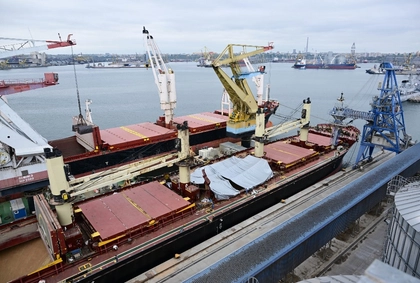The International Monetary Fund recommended against imposing a 50% windfall tax on the banks in 2024.
Ukraine imposed a similar tax at the end of 2023.
JOIN US ON TELEGRAM
Follow our coverage of the war on the @Kyivpost_official.
Imposing a 50% tax on bank profits for a second consecutive year contradicts the nature and intent of windfall taxes, undermines trust in policy, and is not an effective financial solution, Trevor Lessard, the Deputy Head of the International Monetary Fund (IMF) Mission in Ukraine told Interfax-Ukraine.
He added banks may adjust their profit policies to face a possible tax increase.
“For them, it’s very rational to prepare for a third time, as there’s a possibility it will happen again,” Lessard said.
Instead of unexpected tax hikes, Lessard suggests sticking to policies that raise taxes long-term, in an “effective way that yields dividends in the medium term, as opposed to a one-time tax increase that leaves a revenue gap again the following year.”
Ukraine’s National Revenue Strategy, adopted by the Ministry of Finance, aims at long-term reforms to collect more taxes.
“One [part of the National Revenue Strategy] is that the Ukrainian tax system is fundamentally unfair in terms of who pays taxes and who doesn’t, how much they pay, and this dynamic has socio-political as well as economic consequences. So, the people who currently pay taxes are not actually willing to pay more until those who don’t pay start to contribute at least a little,” Lessard said.

Central Bank Raises Key Rate to Tame Inflation Rise
Lessard argues that Ukraine should increase the rate of value added tax (VAT) and implement the carbon border adjustment mechanism (CBAM) to avoid paying large export duties because of CO2 emissions.
On July 18, Ukraine’s Ministry of Finance submitted a bill following consultation with business leaders, but its ambitions have been dramatically cut.
The first draft of the long-awaited bill aimed to raise as much as Hr.125 billion ($3 billion) of new tax income by the end of 2024. But the pressure from Ukraine’s enterprises and cuts made by lawmakers has left Ukraine with the prospect of raising a mere Hr. 21 billion ($512 million) in tax income for this year – 83% less than originally planned.
A huge part of the debate between all stakeholders is focused on which major tax to increase – the military levy or VAT.
Tax is paid from employees’ salaries – this decreases net profits of the business, but also decreases consumption and inflation. This is a pressing issue for Ukraine as inflation hit 8.6% in September and is forecast to reach 9.7% in the first quarter of 2025.
But the same design has a flaw – conscientious employees and enterprises will pay it, but the shadow economy will typically evade it. Raising VAT is seen as an alternative, since it is a tax on final consumption from both the official and shadow parts of the economy.
However, an official familiar with the tax discussions who asked to remain anonymous told Kyiv Post:
“VAT is an indirect tax that influences the price directly, so the military levy is less inflationary. VAT is indeed paid by those who consume rather than earn. We counted that a 1% percent increase in VAT adds about 0.7-0.8% to inflation.”
VAT increases are understood to push inflation upwards for the first 12 months before the impact eases, according to the source.
You can also highlight the text and press Ctrl + Enter






